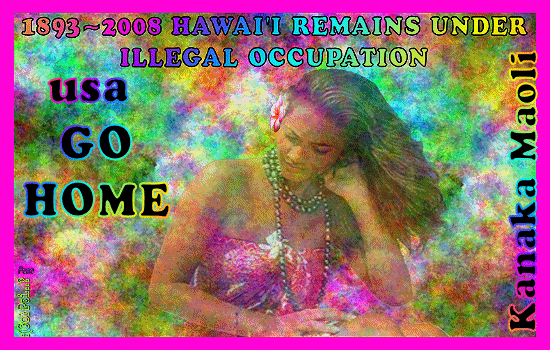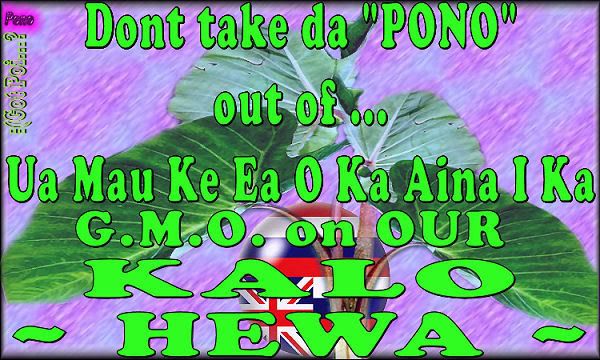
 Protecting Local KnowledgeBy Léo Azambuja, Molokai Dispatch, 27 February 2008Bioprospecting commission seeks to regulate usage of Hawaii’s natural resources.Businesses across the globe are increasingly using native Hawaiian knowledge of Hawaii’s natural resources to produce food, cosmetics, and medicines. While it may seem like an eco-friendly way of facing the future, many in Hawaii are upset that their traditional knowledge is being stolen for commercial purposes.The idea of using local knowledge to create commercial products is called bioprospecting, according to Vicky Takamine, president of ..Ilio..ula o Kalani, a coalition committed to protecting Hawaiian customs and traditions.Takamine, along with the coalition’s executive director, Kaho..onei Panoke, held an informative meeting last week Monday at the Kulana ..Oiwi halau.“Every indigenous people have ownership of their own traditional knowledge,” Takamine said. “We own our knowledge.”The state of Hawaii has no regulations on bioprospecting, according to Takamine.The Legislature passed a resolution on 2006, creating a temporary bioprospecting commission, which Takamine and Panoke are part of. The commission has no funding, making it difficult to gather better input from la..au lapa..au from different islands.This year, Takamine and Panoke are lobbying for a senate bill that would create a funded temporary bioprospecting commission. The bill, SB 151, has already passed three senate committees, and is now referred to the Ways and Means (funding) committee.The temporary bioprospecting commission would expire in 2010, but it may eventually become permanent. It would operate under the Office of Hawaiian Affairs. Commissioners would be in charge of drafting a set of rules and regulations for bioprospecting, as well as a legal definition for bioprospecting.Panoke and Takamine said those interested in bioprospecting would have to receive permission from land owners, the state of Hawaii, and native Hawaiians before collecting samples. A part of revenues from commercialized products would be used to benefit Hawaiian communities.Takamine said rules would protect the intellectual rights of native Hawaiians, whose traditional practices have been handed down from la..au lapa..au for generations.Native Hawaiians are stewards of their natural resources, according to Takamine. She said they “need to work with the state of Hawaii to make sure there are rules and regulations affecting the gathering of those resources.”Don’t blame the kaloThe meeting also served for a brief discussion on a bill asking for a 10 year moratorium on genetic modified kalo.“We don’t want anyone messing with our kalo,” Takamine said.Takamine said SB 958 needs a hearing, and the community should call legislators requesting for it.“There’s a scientist in Hilo who continues to do scientific research on our kalo, taking genes from rice, wheat and grapes and injecting that into the kalo,” Takamine said. The scientist is trying to come up with a stronger variety of kalo, more resistant to pests such as the apple snail.“We didn’t ask them for that,” Takamine said. “Don’t blame the kalo, it’s not the kalo’s fault.”post fromNini'ane
Protecting Local KnowledgeBy Léo Azambuja, Molokai Dispatch, 27 February 2008Bioprospecting commission seeks to regulate usage of Hawaii’s natural resources.Businesses across the globe are increasingly using native Hawaiian knowledge of Hawaii’s natural resources to produce food, cosmetics, and medicines. While it may seem like an eco-friendly way of facing the future, many in Hawaii are upset that their traditional knowledge is being stolen for commercial purposes.The idea of using local knowledge to create commercial products is called bioprospecting, according to Vicky Takamine, president of ..Ilio..ula o Kalani, a coalition committed to protecting Hawaiian customs and traditions.Takamine, along with the coalition’s executive director, Kaho..onei Panoke, held an informative meeting last week Monday at the Kulana ..Oiwi halau.“Every indigenous people have ownership of their own traditional knowledge,” Takamine said. “We own our knowledge.”The state of Hawaii has no regulations on bioprospecting, according to Takamine.The Legislature passed a resolution on 2006, creating a temporary bioprospecting commission, which Takamine and Panoke are part of. The commission has no funding, making it difficult to gather better input from la..au lapa..au from different islands.This year, Takamine and Panoke are lobbying for a senate bill that would create a funded temporary bioprospecting commission. The bill, SB 151, has already passed three senate committees, and is now referred to the Ways and Means (funding) committee.The temporary bioprospecting commission would expire in 2010, but it may eventually become permanent. It would operate under the Office of Hawaiian Affairs. Commissioners would be in charge of drafting a set of rules and regulations for bioprospecting, as well as a legal definition for bioprospecting.Panoke and Takamine said those interested in bioprospecting would have to receive permission from land owners, the state of Hawaii, and native Hawaiians before collecting samples. A part of revenues from commercialized products would be used to benefit Hawaiian communities.Takamine said rules would protect the intellectual rights of native Hawaiians, whose traditional practices have been handed down from la..au lapa..au for generations.Native Hawaiians are stewards of their natural resources, according to Takamine. She said they “need to work with the state of Hawaii to make sure there are rules and regulations affecting the gathering of those resources.”Don’t blame the kaloThe meeting also served for a brief discussion on a bill asking for a 10 year moratorium on genetic modified kalo.“We don’t want anyone messing with our kalo,” Takamine said.Takamine said SB 958 needs a hearing, and the community should call legislators requesting for it.“There’s a scientist in Hilo who continues to do scientific research on our kalo, taking genes from rice, wheat and grapes and injecting that into the kalo,” Takamine said. The scientist is trying to come up with a stronger variety of kalo, more resistant to pests such as the apple snail.“We didn’t ask them for that,” Takamine said. “Don’t blame the kalo, it’s not the kalo’s fault.”post fromNini'ane

Comments
Bioprospecting commission takes issues to Molokai
By Carolyn Girard, Molokai Times
Bill aims to protect Hawaiian knowledge and resources.
A bill advocating for the protection of traditional Hawaiian knowledge from outsiders, who might exploit the knowledge for profit, passed its second reading last month. Members of the commission on bioprospecting came to Molokai Feb. 18 to inform the public of its implications and gain feedback.
Vicky Holt Takemine, president of a private grassroots activist organization called ..Ilio..ulaokalani, is one of five Hawaiians on the bioprospecting commission supporting Bill 151. She explained the nature of bioprospecting and what the commission wants to push forward in its next unscheduled hearing.
“The idea of the bioprospecting is to take the chemical compound in traditional medicines or biological resources, to be able to duplicate that in a lab, come up with a commercial product and then put it on the market,” Takemine said.
She used Paul Mitchell shampoo as an example of a Hawaiian tradition that was exploited and marketed. The shampoo uses awapuhi, a Hawaiian root known as Hawaiian Ginger.
“We have no idea how Paul Mitchell figure out that the awapuhi was good shampoo,” she said. “How many of you have gone swimming in the streams and found the awapuhi and then squeezed it on your hair as a shampoo and made it silky. We've been doing that for thousands of years.”
Takemine said this knowledge of the awapuhi's shampoo essences was taken from the Hawaiian people and marketed without their permission and without any financial return to the islands.
This and any other exploitation are currently legal, as no laws or regulations exist to stop researchers and anyone else from collecting samples.
“You can collect samples of any kind of biological resources in the wild, in the ocean, up in the northwest, on coral reefs and then do your research,” she said. “If you come up with a commercially viable product, there's no way the State of Hawaii gets a benefit, or any native Hawaiian benefits from it.”
Takemine said the indigenous people have the right to protect their traditions as Intellectual Property, and the commission is trying to get regulations enforced that would require prospectors to get permission from landowners, the native Hawaiian people and the state before using any Hawaiian biological resources for research or marketing purposes.
Wayne Panoke, director on the Ilio board and also a commission member, said Bill 151 is calling for two things. The commission has recommended that the commission be housed under the roof of the Office of Hawaiian Affairs. The other recommendation is that the first year budget be set at $300,000 so the commission can afford to hire an executive director, or manager, and other staff to continue the work as designated by the commission. The commission is also considering adding members of the Hawaiian Civics Club who have knowledge of bioprospecting issues.
“We've requested that the commission be permanent, and not temporary,” Panoke said.
Currently, the bill is being redrafted while recommendations for a permanent commission are being made
>Nini'ane